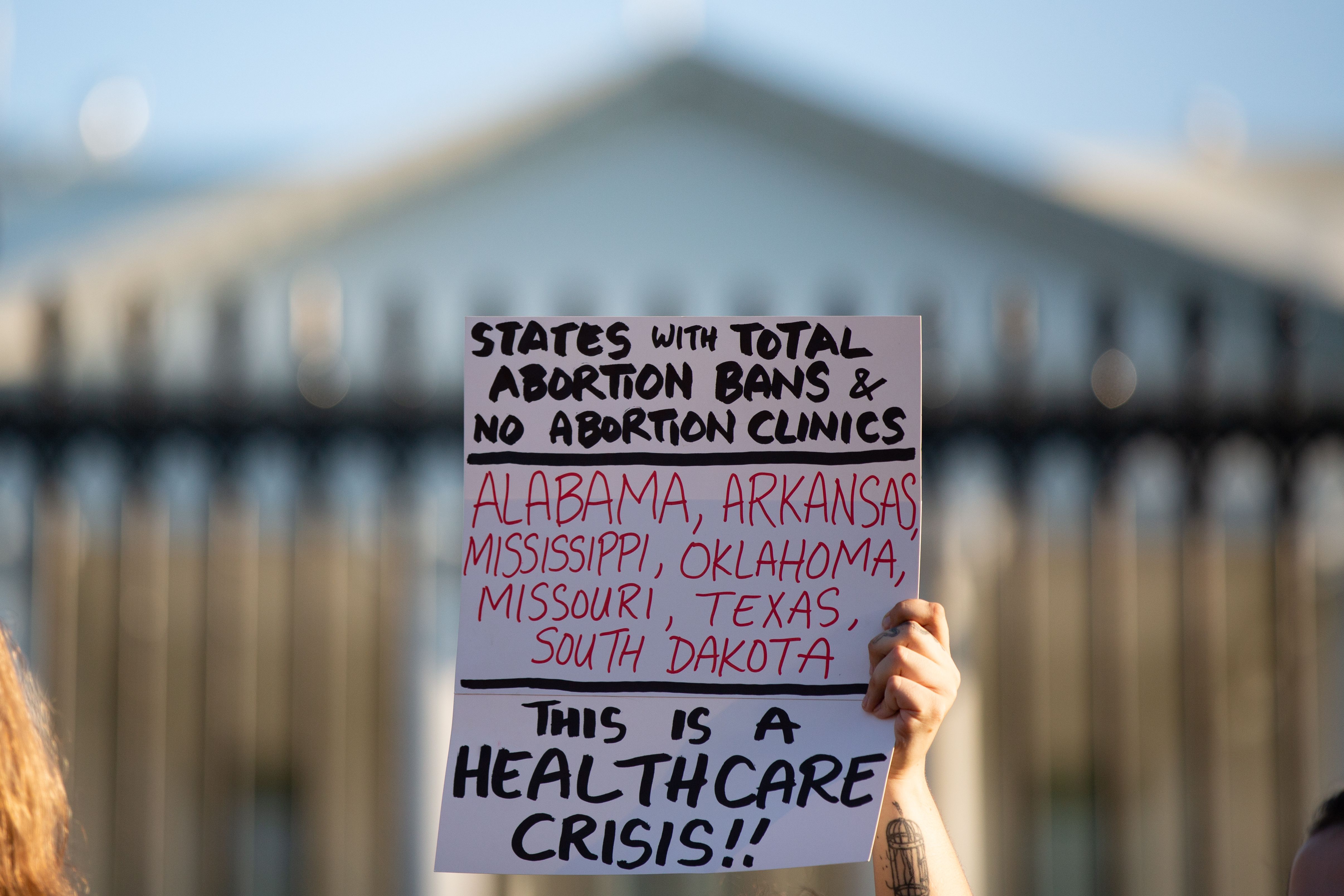A wave of anti-abortion ‘trigger’ laws are now in effect. More are coming
Two months after the Supreme Court struck down Roe v Wade, abortion is outlawed in 12 states and more than 20 million women have lost access to care, Alex Woodward reports


Anti-abortion “trigger” laws designed to take effect after the fall of Roe v Wade are now active in three more states – Texas, Tennessee and Idaho – joining eight others where most abortions are outlawed, two months after the US Supreme Court’s decision to strike down the constitutional right to abortion care.
In Texas, where clinics stopped abortion care over fears of prosecution in the aftermath of the Supreme Court decision, abortion providers can now face $100,000 in fines and life in prison if convicted.
The law criminalises abortion care from the moment of fertilisation, with exceptions only if the pregnant patient faces “a life-threatening physical condition aggravated by, caused by, or arising from a pregnancy.” It does not include exceptions for pregnancies from rape or incest.
In Tennessee, abortion is outlawed with exceptions only to prevent death or serious and permanent injury to the patient. There are no exceptions for pregnancies from rape or incest.
And in Idaho, a near-total abortion ban requires survivors of rape or incest to file a police report and share that with their doctor, which abortion rights advocates have argued is unrealistic, traumatising and impossible to navigate.
Providers could face up to five years in prison if convicted and permanently lose their medical license.
A federal judge in that state temporarily blocked a part of that law hours before it was in effect.
On 24 August, US District Court Judge B Lynn Winmill granted a preliminary injunction that prohibits the state from enforcing the anti-abortion law “to the extent that statute conflicts” with the Emergency Medical Treatment and Active Labor Act. Health providers will not face prosecution or arrest if they provide abortions during emergency medical care.
The order follows a lawsuit from the US Department of Justice – the first under President Joe Biden’s administration in the aftermath of the Supreme Court ruling – that argues that Idaho’s abortion ban violates the federal law requiring doctors to provide emergency medical treatment, including abortions, despite anti-abortion restrictions at the state level.
That decision came just two days after a federal judge in Texas sided with the state in its lawsuit against the Biden administration over that same guidance for emergency abortion care.
Texas US District Court Judge James Wesley Hendrix, an appointee of Donald Trump, said that guidance issued by the Biden administration was “unauthorised” and “well beyond” the text of the law, which is “silent on abortion”.
The conflicting rulings reflect immense disparities in abortion access and the the patchwork state of abortion rights, now determined by the state in which a person lives.
White House press secretary Karine Jean-Pierre noted that the conflicting rulings mean abortion patients in Idaho will be able to that emergency care, under federal law, while patients in Texas will be “denied this same life-saving care” and “may die as s result.”
“Republican legislators continue to deny women’s access to health care. And, they are committed to moving America backward – with fewer rights and less autonomy,” she said in a statement on 25 August. “Americans across the country and of all backgrounds agree that women should have the right to make their own personal health care decisions and to receive life-saving medical care, without interference from politicians, and the president will continue to take action to protect women’s access to lifesaving health care.”
Where abortion is outlawed two months after the fall of Roe
Abortion is outlawed in most cases in 12 states, including Idaho, Tennessee and Texas, as well as Alabama, Arkansas, Kentucky, Louisiana, Mississippi, Missouri, Oklahoma, South Dakota and Wisconsin.
Laws in Louisiana and Mississippi forced the closure of those states’ remaining clinics, leaving the neighbouring Deep South states without abortion clinics for the first time in nearly 50 years.
More than 40 clinics in more than a dozen states closed in the months after the Supreme Court ruling.
Clinic closures and newly enacted restrictions have stripped abortion access for more than 20 million women in their home states – or about one in three girls and women between the ages of 15 and 44, according to US Census data reviewed by The Washington Post.
Georgia and Ohio have outlawed abortion at roughly six weeks of pregnancy, before many people know they are pregnant. Texas also was enforcing a similar law until its latest trigger ban took effect.
Dyana Limon-Mercado, executive director of Planned Parenthood Texas Votes, stressed that while the “trigger” ban is effective, “it doesn’t change the reality on the ground: there is no abortion access in Texas”.
“It’s clear that with abortion already banned, the point of this new trigger law is one thing: cruelty,” she said in a statement. “It is cruelty towards the doctors who could be subject to life in prison for providing health care. It is cruelty towards patients experiencing miscarriage or pregnancy complications who are now at risk of being denied a life-saving procedure.”
Temporary restraining orders have blocked anti-abortion laws in North Dakota, South Carolina, Utah, West Virgina and Wyoming while their legal challenges play out in court, adding to a constantly shifting legal landscape for patients and providers that has thrown the already-fragile environment for abortion care into chaos.
‘Unfolding public health crisis’
More anti-abortion laws are scheduled to take effect in the coming days and weeks.
North Dakota’s ban outlaws abortion from conception but the law has been temporarily blocked by the courts. It was set to go into effect on 26 August but was blocked a second time, one day earlier, while the legal challenge plays out.
Oklahoma also enhanced criminal penalties for providing abortion care, including a 10-year prison sentence and fines up to $100,000.
A recently passed law in Indiana – the first state to pass new anti-abortion legislation after the Supreme Court decision – will take effect on 15 September.
And Arizona’s anti-abortion abortion law, which outlaws abortion care at 15 seeks of pregnancy, is scheduled to go into effect on 24 September, while a court considers the legality of a territorial law from 1901 – before Arizona was a state – that outlaws abortion care.
“Vast swaths of the nation, especially in the South and Midwest, are now abortion deserts that, for many, will be impossible to escape,” according to Nancy Northup, president and CEO of the Center for Reproductive Rights, which has challenged several anti-abortion laws in courts across the country.
“Evidence is already mounting of women being turned away despite needing urgent, and in some cases life-saving, medical care,” she said in a statement. “This unfolding public health crisis will only continue to get worse. We will see more and more of these harrowing situations, and once state legislatures reconvene in January, we will see even more states implement abortion bans and novel laws criminalizing abortion providers, pregnant people, and those who help them.”
Abortion rights on the ballot
The incoming tide of anti-abortion legislation also comes as voters in Kansas overwhelmingly rejected a state constitutional amendment that would deny the right to abortion care, while abortion rights has taken centre stage in midterm elections across the US.
The Supreme Court’s decision also has prompted states with abortion protections to strengthen them, and a surge of women voters in several states have registered in the aftermath of the leaked draft of the high court’s opinion and its final ruling on 24 June.
A majority of registered voters – 56 per cent – say abortion is very important in their midterm vote, up from 43 per cent in March, according to a recent Pew Research survey.
That increase is driven by Democratic voters – 71 per cent of Democratic and Democratic-leaning registered voters rate abortion as “very important,” up nearly 30 per cent from just a few months ago.
In November, voters in California and Vermont will decide whether to establish state constitutional rights to abortion.
Voters in Michigan also are likely to vote on a similar amendment.
Join our commenting forum
Join thought-provoking conversations, follow other Independent readers and see their replies
Comments



Bookmark popover
Removed from bookmarks